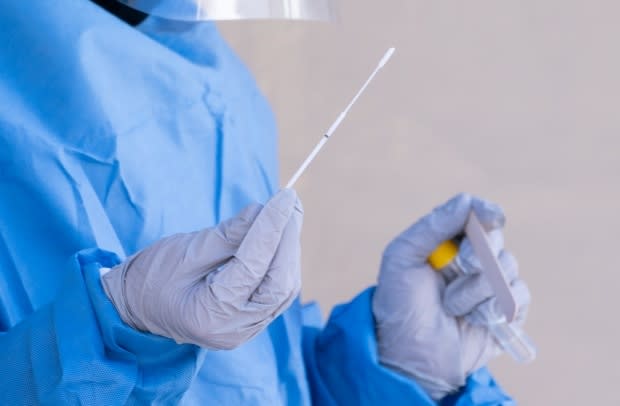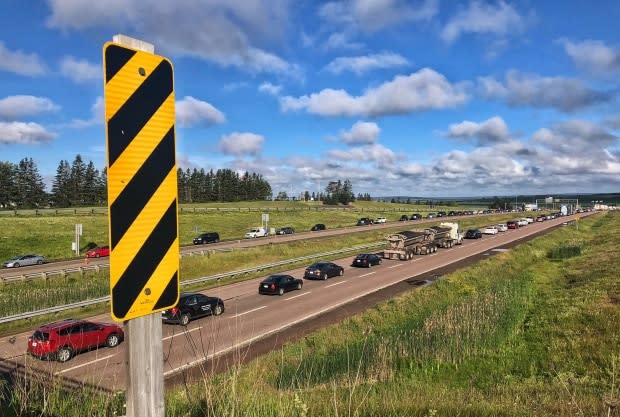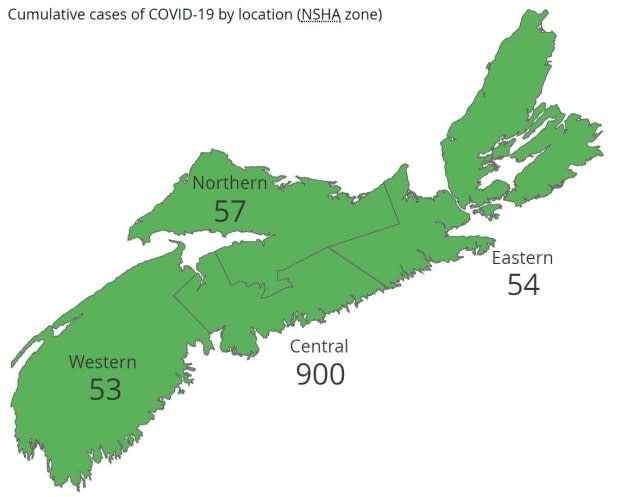'People are becoming complacent' about COVID-19, says Nova Scotia's top doctor
Nova Scotia reported no new COVID-19 cases on Friday, but with the Atlantic bubble now in place the province's top doctor is "extremely worried" people are forgetting about public health guidelines.
Premier Stephen McNeil and Dr. Robert Strang, chief medical officer of health, addressed Nova Scotians in an update Friday.
They said they have both heard many complaints about people not keeping a distance of two metres from others, or failing to wear masks in stores and other areas where physical distancing is not possible.
Strang said he noticed a similar pattern when he's gone into businesses himself.
"I'm extremely worried that people are becoming complacent," Strang said. "The vast majority of people are not wearing masks."
He said the public health guidelines are "extremely important" to ensure COVID-19 spread stays low, which will be even more important now that other neighbouring residents are crossing the border.
Friday marked the start of the Atlantic bubble, where people from all four Atlantic provinces have been given the green light to travel around the region without the need to self-isolate upon arrival.
Strang said Nova Scotia's streak of 20 days without a COVID-19 case, which ended Tuesday, might have led to a feeling that the pandemic is over and people can let their guard down, but "that couldn't be further from the truth."
Recent cases are reminder to be careful: Strang
The province currently has three COVID-19 active cases, with the latest announced on Thursday.
The QEII Health Sciences Centre's microbiology lab completed 372 tests on Thursday and is operating 24 hours a day. There were no new cases reported Friday.
"Maybe the cases of this week are actually in some ways a fortunate reminder about needing to maintain our vigilance," Strang said.
When asked about whether the province would consider making masks mandatory in indoor public places, like Toronto has done, Strang said there are many steps they can take before moving to that option, but it's not off the table.

Right now, he said it's important to change the social norm and public health is working with the business and restaurant industries to ensure they understand their importance as well as maybe eventually providing them with masks to hand out to customers.
Strang asked citizens to "really step up our game" and be careful about public health rules because these are the things that allow people to gather more freely and get out to shops and restaurants.
"If we're not careful, we run the very real risk of having a resurgence of COVID-19 and having to tighten things up again, which I know nobody wants to have," he said.
Nova Scotians urged to welcome neighbours
McNeil noted that there were long lines in both directions across the borders of Maritime provinces on Friday, and are hoping to "smooth that out" over the weekend.
Everyone entering Nova Scotia needs proof they live in Atlantic Canada if they want to travel freely.
Although there have been cases of "plate shaming" in various communities where people report others for out-of-province licence plates, McNeil urged Nova Scotians to smile or wave when they see tourists from other parts of Atlantic Canada.

"We want them to come here to eat in our restaurants, to shop in our stores," McNeil said. "Opening up the Atlantic region is good for our economy and it will help us gain confidence as we learn to live with COVID."
Strang said people should not be nervous that this bubble means a higher likelihood of COVID-19 spread. All Atlantic provinces have low numbers and stable cases, so "there is no difference" in risks between them.
Province to increase visitor tracking
Anyone coming in from outside the region, especially the United States, will be asked for their phone numbers and names so follow-up calls can be made to make sure they are actually self-isolating, McNeil said.
The Canada-U.S. border is closed to non-essential travel, but those with Canadian passports living in America may be trying to come home, McNeil noted. He said he has heard stories of Americans and people from elsewhere in Canada arriving and not self-isolating for 14 days, which is "not acceptable."
McNeil said the province will now be "ramping up" their calls and check-ins to make sure people are where they said they would be, and following all of the rules.
"We want to be open and welcoming, but we are not going to let our guard down," McNeil said.
There is a separate lane for essential personnel to get across more quickly, including trucks carrying goods and health-care workers.
McNeil said he still hopes to allow travellers from other parts of Canada the same ease of travel in mid-July, but will follow what happens over the next number of weeks.
More services reopen
The Cosmetology Association of Nova Scotia said Friday that salons and spas can now allow things like facials, beard trims, hair removal and makeup application.
As of July 3, their guidelines said all facial services that were previously restricted and where a mask could not be worn by the client are now allowed, as long as the service provider wears a face shield and non-medical face mask.
People entering the spa must keep their own mask on until their service actually begins.
To date, Nova Scotia has had 54,317 negative test results, 1,064 positive cases, and 63 deaths.

Two people are currently in hospital but both of their COVID-19 infections are considered resolved.
The easing of certain restrictions that were first announced on June 26 took effect Friday. Some of the changes include an increase in the gathering limit when physical distancing is being practised.
Outdoor events organized by groups like businesses and churches can now have 250 people in attendance. Indoor venues can have 50 per cent of their maximum capacity, up to a maximum of 200 people.
Symptoms list
People with one or more of the following symptoms are asked to visit 811's website to determine if you should go for further assessment:
Fever (i.e. chills, sweats).
Cough or worsening of a previous cough.
Sore throat.
Headache.
Shortness of breath.
Muscle aches.
Sneezing.
Nasal congestion/runny nose.
Hoarse voice.
Diarrhea.
Unusual fatigue.
Loss of sense of smell or taste.
Red, purple or blueish lesions on the feet, toes or fingers without clear cause.
MORE TOP STORIES


